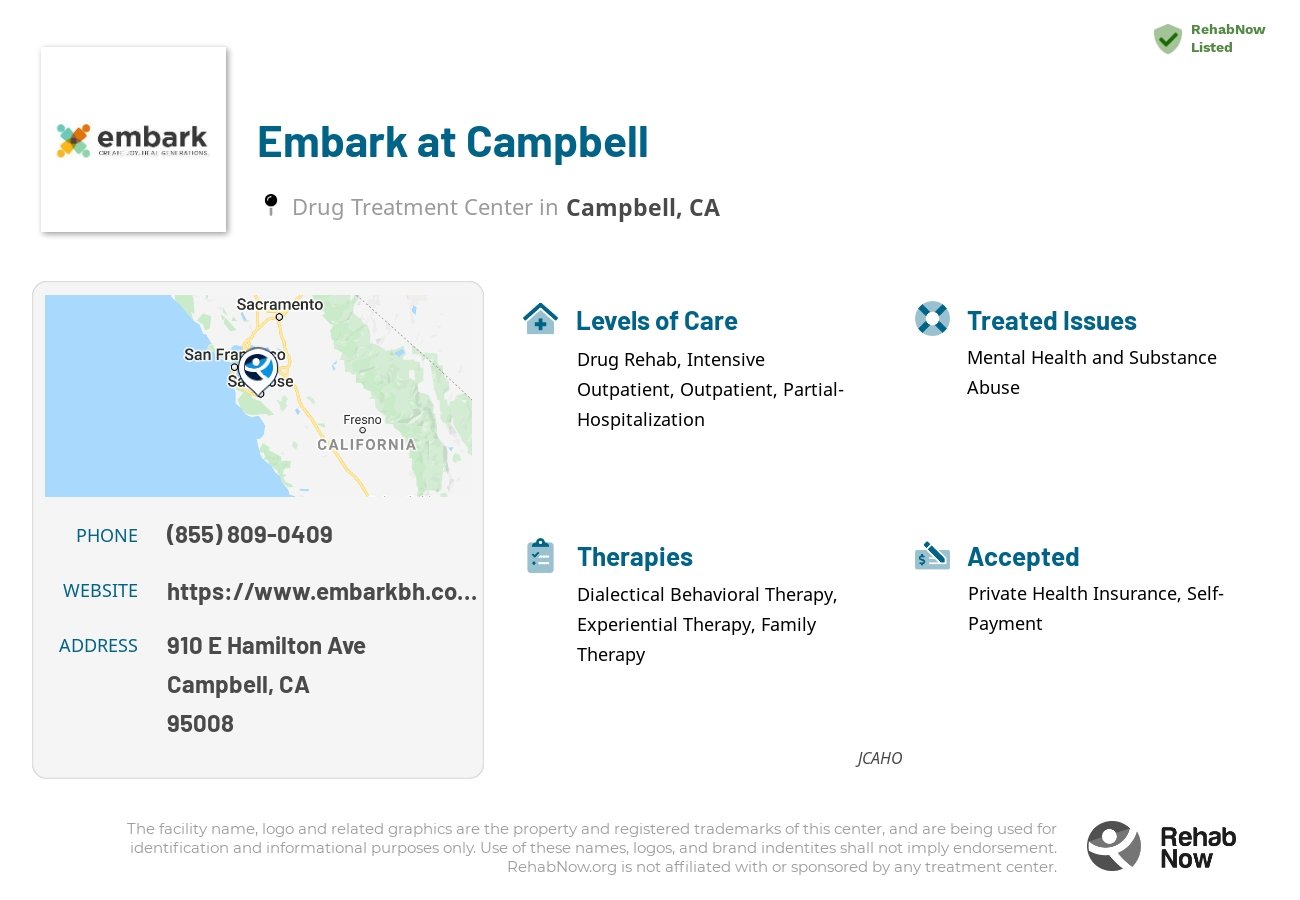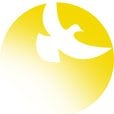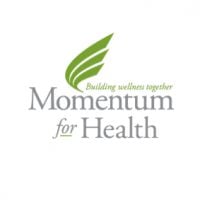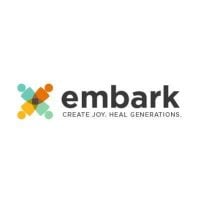
Embark at Campbell
Drug Rehab Center in Campbell, California
- Dual Diagnosis
- Drug Addiction
Embark at Campbell is an accredited addiction treatment facility in California that provides a full range of services from outpatient to residential levels of care for those looking to get sober.
About Embark at Campbell in California
Embark at Campbell, located in the heart of Campbell, California, stands out in the field of mental health and substance abuse treatment. Their mission emphasizes a local, community-based approach to healing, offering a comprehensive outpatient program that includes individual, group, and family therapy alongside innovative therapeutic and peer mentoring. Notably, their focus on creating a nurturing and safe environment caters to both families and their children, making them a unique beacon of hope in their community.
Accredited by the Joint Commission, Embark at Campbell adheres to the highest standards of quality and safety in healthcare. This esteemed recognition underlines their commitment to offering top-notch care, specializing in dual diagnosis, and providing a range of treatment levels including outpatient services tailored to the individual's needs. Their dedication to quality care is evident in their wide array of therapies and holistic approaches designed to foster lasting recovery.
- Comprehensive Dual Diagnosis Treatment: Embark at Campbell excels in addressing both mental health issues and substance abuse, providing targeted care for those dealing with co-occurring conditions.
- Community-Based Healing Approach: The center's commitment to local, community-based treatment ensures that help is accessible, promoting recovery within a supportive environment.
- Wide Range of Treatment Options: From intensive outpatient to partial hospitalization programs, Embark at Campbell offers a variety of levels of care to meet diverse needs.
Embark at Campbell is adept at treating a myriad of addictions and co-occurring mental health disorders, using evidence-based therapies alongside holistic approaches. Their methodical treatment methods are delivered through various levels of care, including residential and outpatient programs, ensuring personalized and effective recovery pathways for their clients.
Genders
Ages
Modality
Additional
Accreditations

JCAHO
Conditions and Issues Treated
Levels of Care Offered
This center offers a variety of custom treatment tailored to individual recovery. Currently available are Drug Rehab, Intensive Outpatient, Outpatient, Partial-Hospitalization, Residential, with additional therapies available as listed below.
The Intensive Outpatient Program offered by Embark at Campbell is designed for those who need intensive care but would rather get it in the comfort of their own home. The treatment programs vary in duration and intensity and can be tailored to suit the patient’s needs. The program includes regular visits to the facility, though the overnight stay is not needed. IOP is suitable for patients who have been treated in residential treatment programs and are in the transition phase. It helps the patient live at home and discharge some work or school responsibilities even while undergoing treatment. The patients gradually get back to their routine life with the support of a friend or family member.
Outpatient treatment is often used for drug addicts in drug rehab. Outpatient treatment consists of counseling and therapy sessions. This form of treatment is also called ‘day-treatment’. The outpatient treatment process begins with the addict’s initial detox period, lasting about ten days.
Outpatient treatment is used for those who are at moderate risk for ‘slipping back’ into the addiction, for those who:
- Are not currently experiencing any side effects from withdrawal and can handle social pressure
- Can handle stressors that might trigger relapse
- Have a stable living environment or have moved out of their previous environment, which was not conducive to being sober
- Have a support system that allows them to go to a facility a few times a week while still keeping their current responsibilities
- Have no legal obligations, being either on parole or probation, that require them to seek treatment at a mandatory facility
- Are not currently experiencing any side effects from withdrawal and can handle social pressure
- Have a stable living environment or have moved out of their previous environment, which was not conducive to being sober
Partial hospitalization programs offer another level of addiction treatment at Embark at Campbell.
Residential treatment programs are those that offer housing and meals in addition to substance abuse treatment. Rehab facilities that offer residential treatment allow patients to focus solely on recovery, in an environment totally separate from their lives. Some rehab centers specialize in short-term residential treatment (a few days to a week or two), while others solely provide treatment on a long-term basis (several weeks to months). Some offer both, and tailor treatment to the patient’s individual requirements.
Therapies & Programs
Because no single treatment is effective for all addicts, the goal of treatment and therapy should be to figure out what works best for each individual. Tolerance and withdrawal levels differ from person to person, affecting the treatment intensity required. Addiction treatment should aim to help addicts develop healthy coping mechanisms for dealing with their addiction and its underlying causes.
Family therapy is beneficial for people who are in addiction treatment services because it offers addicts the opportunity to work with their family members to better understand what led them to make choices that contributed to their addiction.
This type of therapy helps family members reach a deeper understanding of how they can best support their loved one during recovery. It also helps the addict better understand their own motivations and triggers that led them to turn to substance abuse.
Family therapy can help addicts in the following ways:
- Assists family members in processing difficult feelings so they don’t blame or resent recovering addicts
- Assists family members in understanding how addiction has impacted the addict and everyone who is involved with them
- Allows the addict to take responsibility for their actions, while encouraging improved communication skills
- Helps family members understand how to best support an individual in recovery so addicts don’t relapse again.
Group therapy can help build a stronger support system and give addicts in Campbell, CA insight into their addiction that they gain through shared conversations. Group therapy occurs in a controlled group environment, exclusive of one on one meetings. This makes it safer for patients to feel comfortable sharing the struggles they’re going through and gaining perspective.
Dialectical Behavior Therapy (DBT) is a cognitive-behavioral therapy that helps patients understand the relationship between their thoughts, feelings, and behaviors. It is beneficial for those whose addictions and behaviors stem from severe mental health issues. The term “Dialectic” means the integration of opposites. In substance abuse, DBT refers to accepting the patient’s addiction and working to change their thoughts and behavior. It improves life skills such as controlling intense emotions without reacting impulsively, resolving interpersonal conflicts effectively, and promoting awareness about self and others.
Patient Experience
Experiential Therapy at Embark at Campbell
Experiential therapy uses engaging activities to help patients access deeper, often hidden emotions. For example, the patient could role-play a problematic situation or engage in activities like drawing, painting, poetry writing, music composition, exercising, or journaling to help process intense feelings.
Experiential therapy is a type of therapeutic approach that focuses on having patients work through problems, issues, or emotions by engaging directly in some real experience. Experiential therapy occurs face-to-face with a therapist who helps these people to explore their feelings first hand.
It is based on the belief that to truly understand and gain insight into oneself and behavior; it is necessary and helpful to have real experiences with the issues involved. Some therapists have developed the experiential therapy approach as a way of treating addictive behaviors or dealing with impulses related to addiction. It comes from an existential school of psychotherapy called ‘experiential existential.’
Payment Options Accepted
For specific insurance or payment methods please contact us.
Is your insurance accepted?
Ask an expert, call (888) 674-0062
Additional Details
Specifics, location, and helpful extra information.
Campbell, California 95008 Phone Number(855) 809-0409 Meta DetailsUpdated April 15, 2024
Staff Verified
Embark at Campbell Patient Reviews
There are no reviews yet. Be the first one to write one.
Campbell, California Addiction Information
More than 3 million of California's citizens are addicted to illegal drugs. Almost 800,000 people use hard drugs, almost 5 million use marijuana, and another 2.1 million abuse alcohol every year. Other substance abuse issues such as binge drinking and teen drug use are also common. Many illegal drugs such as cocaine, heroin, methamphetamine, and marijuana are smuggled into the state from Mexico.
The drug addiction problem in Campbell, California, is unfortunately quite severe. According to recent statistics, there were over 1,000 people admitted to rehab facilities in Campbell for drug addiction in 2016. This is a significant increase from previous years, and, likely, the problem has only gotten worse since then. Fortunately, some drug treatment facilities in the area can help people struggling with addiction get sober.
Treatment in Nearby Cities
- Lompoc, CA (201.3 mi.)
- Lake Forest, CA (347.6 mi.)
- Rancho Cucamonga, CA (328.6 mi.)
- Morgan Hill, CA (19.1 mi.)
- Scotts Valley, CA (17.3 mi.)
Centers near Embark at Campbell
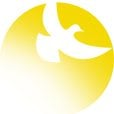
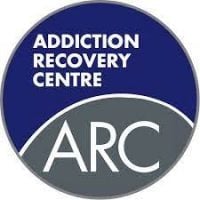

The facility name, logo and brand are the property and registered trademarks of Embark at Campbell, and are being used for identification and informational purposes only. Use of these names, logos and brands shall not imply endorsement. RehabNow.org is not affiliated with or sponsored by Embark at Campbell.


